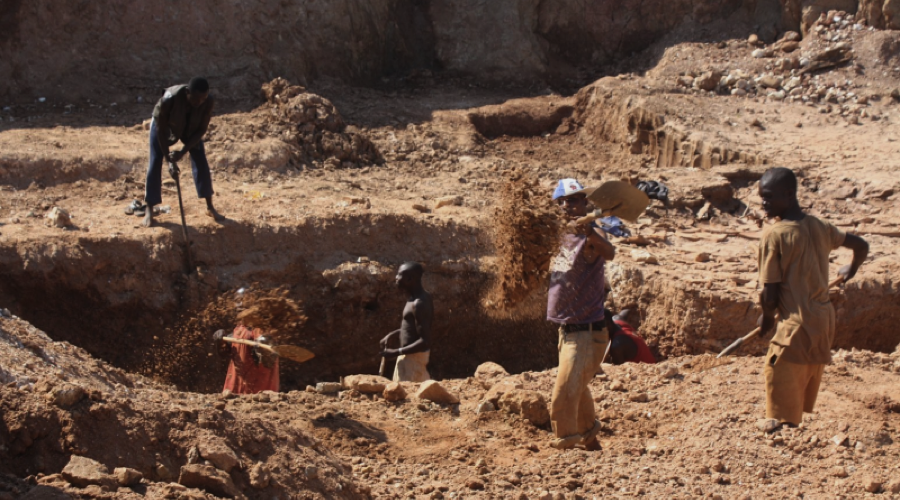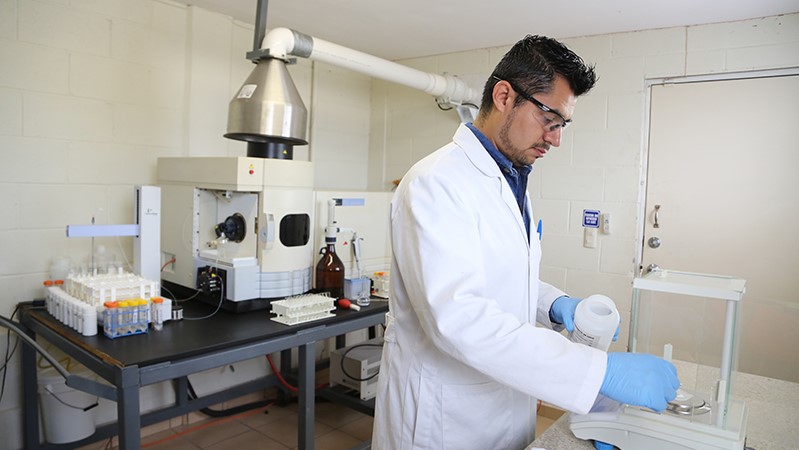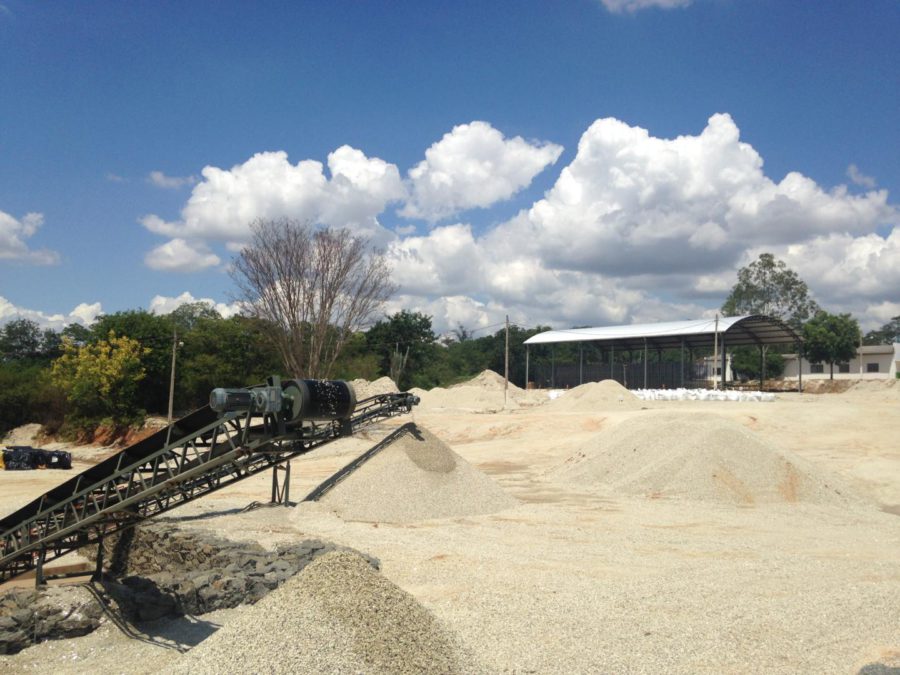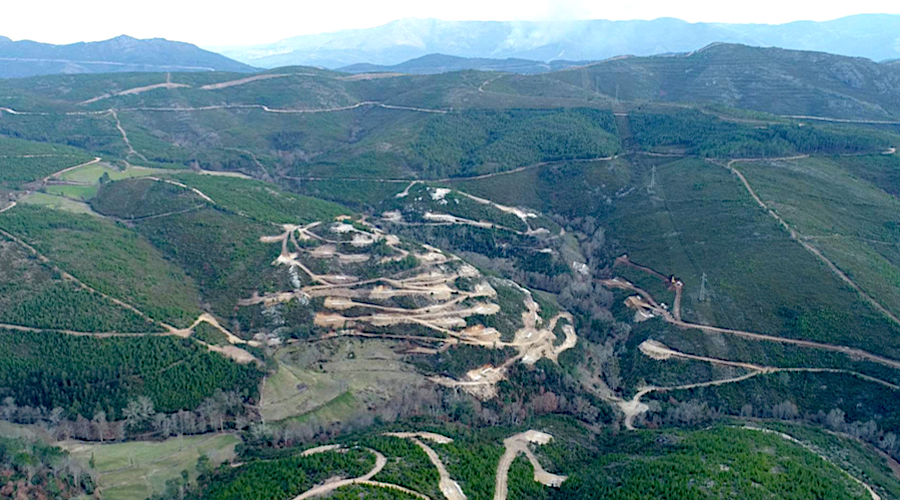Africa gears up to keep more of the profits from lithium boom
Reuters | February 9, 2023 | 4:14 am Battery Metals Intelligence Africa Lithium

Zimbabwe has large deposits of lithium. (Image courtesy of Human Rights Watch)
Lithium-rich African countries, including Zimbabwe and Namibia, are trying to develop processing and refining industries to capture more of the profits of global demand for the battery material.

As the auto industry shifts towards electric vehicles (EVs) – spurred by proposed bans on fossil-fuel cars beginning at the end of the decade – lithium prices and demand have soared.
China, the world’s top lithium refiner and a leading producer dominates the supply chain, but Western governments and international companies are trying to challenge that and see Africa’s lithium reserves as an opportunity.
For their part, African countries are determined to retain more of the value of their resources than they have in the past, which means not just mining them but processing them before export, which economically is referred to as beneficiation.
“We are saying to ourselves, if you have got the minerals that everybody wants now, you need to make sure that at least you probably mine those minerals differently and not in the usual manner,” Namibia’s mines minister Tom Alweendo told Reuters in an interview at the Investing in African Mining Indaba in Cape Town.
“We are going to insist that all lithium mined within the country has to be processed in the country.”
Africa’s lithium production is set to rapidly increase this decade. From 40,000 tonnes this year, the continent will likely produce 497,000 tonnes in 2030, commodities trader Trafigura estimates, with the bulk of that coming from Zimbabwe.
Prices for lithium more than doubled last year as demand from the electric vehicle industry outstripped supply.
Zimbabwe in December imposed a ban on raw lithium exports, a measure aimed at stopping the smuggling of lithium ore and spurring mines to process in the country.
“We made plans to only allow the export of concentrates,” the country’s mining minister Winston Chitando told Reuters. “Because of the ban, other investors have come in wanting to mop up lithium ores and develop them to concentrate stage.”
‘Poison of greed’
Mining has often been linked to the exploitation of workers or environmental degradation by foreign powers. In his visit to Democratic Republic of Congo, Pope Francis at the end of January condemned the “poison of greed” for mineral resources that has exacerbated conflict in the country’s east.
The latest effort by African governments is far from the first time they have resolved to retain more of the value of their mineral wealth, which ultimately should boost tax revenue, encourage new businesses and add jobs.
The global transition away from fossil fuels is giving a sense of urgency, although many obstacles remain, notably insufficient electricity supply.
As companies and investors around the world focus on goals to reduce carbon emissions and increase supplies of the minerals that should help, companies and investors are reconsidering projects they may have previously overlooked.
“These are really unique times we are living in, with this whole transition to a clean energy future and Ghana could be part of this story,” Len Kolff, interim chief executive officer at Atlantic Lithium, said.
The company’s Ewoyaa mine project is set to be the first lithium producer in the West African country. US firm Piedmont Lithium has signed a deal to get 50% of the lithium produced.
“Everybody’s approaching us, like the whole who’s who on the Chinese list and now it’s all the Western OEMs [original equipment manufacturers],” Kolff said.
In Mali, Leo Lithium’s Goulamina mine plans to take advantage of high prices to export two 30,000-tonne shipments of lithium ore by the end of this year, managing director Simon Hay said.
The proceeds would help to develop the project to allow domestic processing, Hay said, with first production expected in the middle of next year to be sent to China’s Ganfeng Lithium.
($1 = 0.9319 euros)
(By Clara Denina, Wendell Roelf and Helen Reid; Editing by Barbara Lewis)
Future Mexican lithium tie-ups must give govt majority stake: LitioMx CEO
Reuters | February 9, 2023 |

Image from Bacanora Lithium.
Future lithium mining joint ventures between Mexico’s new state-run company and private producers must give the government a majority stake, the head of LitioMx told Reuters, while also expressing openness to offer tax breaks to kick-off projects.

Championed by President Andres Manuel Lopez Obrador, Mexican lawmakers enacted sweeping lithium nationalization last year seeking to ensure government control over the country’s nascent industry, even as opponents sharply criticized the move as likely to dissuade private investment in Mexico’s mostly clay-based deposits.

But in an interview late on Wednesday, LitioMx Chief Executive Pablo Taddei stressed that private players could partner up with the new state-owned company so long as the government can exercise control over the projects, which the government has declared as strategic.
“There isn’t any doubt that the Mexican government must have control in a strategic association with private companies,” Taddei said.
Lopez Obrador created LitioMX, formally known as Litio Para Mexico, by decree last August, even though the country does not yet produce any lithium despite indications it could hold potentially rich deposits of the ultra-light white metal.
Lithium is coveted by makers of rechargeable batteries, crucial components for future fleets of electric vehicles.
Taddei, who holds graduate degrees from Harvard University and the University of Michigan in the United States, added that the government was also prepared to offer tax incentives in an effort to make such tie-ups attractive to both sides.
“They have to be associations that are attractive to them and us,” he said, adding that future lithium mining projects will be analyzed on a case-by-case basis.
“We are open to giving those incentives to make it a win-win.”
Taddei declined to detail tax or other would-be financial incentives the government might consider.
But Taddei did explain that future joint ventures would take into consideration factors, including the type of deposit, in deciding what percent of projects the government should own.
To date, Mexican lithium deposits identified in early exploration efforts reveal mostly clay-based deposits, which many industry experts argue will be much more difficult and costly to develop.
Nearly all global lithium production is today mined from brine salt flats, or from traditional rock deposits.
Taddei also declined to name companies with which his team has held meetings, only that some come from outside the United States and Canada.
Ganfeng controls Mexico’s most advanced lithium project, Bacanora Lithium located in northern Sonora state, but Taddei declined to comment on talks over the project.
He did, however, say an announcement concerning the project will come later this month.
Going forward, LitioMx must also have a stake in all technological patents stemming from future projects, Taddei said.
He did not specify a start date for the state company’s first project but expressed optimism that Mexico will ultimately benefit from surging demand for lithium.
(By Valentine Hilaire; Editing by David Alire Garcia and Jacqueline Wong)
DeepRock Minerals options mineral claims near Sigma Lithium in Brazil
Staff Writer | February 9, 2023

Sigma Lithium’s Grota do Cirilo lithium project in Brazil. Credit: Sigma Lithium
DeepRock Minerals (CSE: DEEP) has entered into an option agreement with two Brazilian companies to acquire a 100% interest in the Esperança lithium property, comprising about 2,970 hectares of mineral claims located in Brazil’s Minas Gerais state.

The property covers mapped metasediments of the Salinas formation, where Brazil’s only lithium producer CBL has been mining spodumene for almost 30 years. The same unit also hosts Sigma Lithium’s Grota do Cirilo, which is the the largest hard-rock lithium deposit in the Americas.
As per the option agreement, DeepRock can acquire 100% ownership in the Esperança property over a three-term period through C$100,000 in total cash payments, the issuance of 200,000 common shares, and an accumulative expenditure of C$200,000 in exploration work. The previous owner will retain a 2% net smelter royalty.
Following the agreement, DeepRock intends to immediately start prospecting, sampling, detailed mapping and multispectral analysis of satellite data to identify potential exploration targets on the property.
In addition to Esperança, the company has three other projects under development: the Ralleau VMS project located in the Abitibi region of Quebec, the Golden Gate project in New Brunswick and the Zapozilor polymetallic project in Romania.
Shares of DeepRock Minerals surged 25% The CSE-listed miner has a market value of C$4.5 million ($3.4m).
Reuters | February 9, 2023 | 4:14 am Battery Metals Intelligence Africa Lithium

Zimbabwe has large deposits of lithium. (Image courtesy of Human Rights Watch)
Lithium-rich African countries, including Zimbabwe and Namibia, are trying to develop processing and refining industries to capture more of the profits of global demand for the battery material.

As the auto industry shifts towards electric vehicles (EVs) – spurred by proposed bans on fossil-fuel cars beginning at the end of the decade – lithium prices and demand have soared.
China, the world’s top lithium refiner and a leading producer dominates the supply chain, but Western governments and international companies are trying to challenge that and see Africa’s lithium reserves as an opportunity.
For their part, African countries are determined to retain more of the value of their resources than they have in the past, which means not just mining them but processing them before export, which economically is referred to as beneficiation.
“We are saying to ourselves, if you have got the minerals that everybody wants now, you need to make sure that at least you probably mine those minerals differently and not in the usual manner,” Namibia’s mines minister Tom Alweendo told Reuters in an interview at the Investing in African Mining Indaba in Cape Town.
“We are going to insist that all lithium mined within the country has to be processed in the country.”
Africa’s lithium production is set to rapidly increase this decade. From 40,000 tonnes this year, the continent will likely produce 497,000 tonnes in 2030, commodities trader Trafigura estimates, with the bulk of that coming from Zimbabwe.
Prices for lithium more than doubled last year as demand from the electric vehicle industry outstripped supply.
Zimbabwe in December imposed a ban on raw lithium exports, a measure aimed at stopping the smuggling of lithium ore and spurring mines to process in the country.
“We made plans to only allow the export of concentrates,” the country’s mining minister Winston Chitando told Reuters. “Because of the ban, other investors have come in wanting to mop up lithium ores and develop them to concentrate stage.”
‘Poison of greed’
Mining has often been linked to the exploitation of workers or environmental degradation by foreign powers. In his visit to Democratic Republic of Congo, Pope Francis at the end of January condemned the “poison of greed” for mineral resources that has exacerbated conflict in the country’s east.
The latest effort by African governments is far from the first time they have resolved to retain more of the value of their mineral wealth, which ultimately should boost tax revenue, encourage new businesses and add jobs.
The global transition away from fossil fuels is giving a sense of urgency, although many obstacles remain, notably insufficient electricity supply.
As companies and investors around the world focus on goals to reduce carbon emissions and increase supplies of the minerals that should help, companies and investors are reconsidering projects they may have previously overlooked.
“These are really unique times we are living in, with this whole transition to a clean energy future and Ghana could be part of this story,” Len Kolff, interim chief executive officer at Atlantic Lithium, said.
The company’s Ewoyaa mine project is set to be the first lithium producer in the West African country. US firm Piedmont Lithium has signed a deal to get 50% of the lithium produced.
“Everybody’s approaching us, like the whole who’s who on the Chinese list and now it’s all the Western OEMs [original equipment manufacturers],” Kolff said.
In Mali, Leo Lithium’s Goulamina mine plans to take advantage of high prices to export two 30,000-tonne shipments of lithium ore by the end of this year, managing director Simon Hay said.
The proceeds would help to develop the project to allow domestic processing, Hay said, with first production expected in the middle of next year to be sent to China’s Ganfeng Lithium.
($1 = 0.9319 euros)
(By Clara Denina, Wendell Roelf and Helen Reid; Editing by Barbara Lewis)
Future Mexican lithium tie-ups must give govt majority stake: LitioMx CEO
Reuters | February 9, 2023 |

Image from Bacanora Lithium.
Future lithium mining joint ventures between Mexico’s new state-run company and private producers must give the government a majority stake, the head of LitioMx told Reuters, while also expressing openness to offer tax breaks to kick-off projects.

Championed by President Andres Manuel Lopez Obrador, Mexican lawmakers enacted sweeping lithium nationalization last year seeking to ensure government control over the country’s nascent industry, even as opponents sharply criticized the move as likely to dissuade private investment in Mexico’s mostly clay-based deposits.

But in an interview late on Wednesday, LitioMx Chief Executive Pablo Taddei stressed that private players could partner up with the new state-owned company so long as the government can exercise control over the projects, which the government has declared as strategic.
“There isn’t any doubt that the Mexican government must have control in a strategic association with private companies,” Taddei said.
Lopez Obrador created LitioMX, formally known as Litio Para Mexico, by decree last August, even though the country does not yet produce any lithium despite indications it could hold potentially rich deposits of the ultra-light white metal.
Lithium is coveted by makers of rechargeable batteries, crucial components for future fleets of electric vehicles.
Taddei, who holds graduate degrees from Harvard University and the University of Michigan in the United States, added that the government was also prepared to offer tax incentives in an effort to make such tie-ups attractive to both sides.
“They have to be associations that are attractive to them and us,” he said, adding that future lithium mining projects will be analyzed on a case-by-case basis.
“We are open to giving those incentives to make it a win-win.”
Taddei declined to detail tax or other would-be financial incentives the government might consider.
But Taddei did explain that future joint ventures would take into consideration factors, including the type of deposit, in deciding what percent of projects the government should own.
To date, Mexican lithium deposits identified in early exploration efforts reveal mostly clay-based deposits, which many industry experts argue will be much more difficult and costly to develop.
Nearly all global lithium production is today mined from brine salt flats, or from traditional rock deposits.
Taddei also declined to name companies with which his team has held meetings, only that some come from outside the United States and Canada.
Ganfeng controls Mexico’s most advanced lithium project, Bacanora Lithium located in northern Sonora state, but Taddei declined to comment on talks over the project.
He did, however, say an announcement concerning the project will come later this month.
Going forward, LitioMx must also have a stake in all technological patents stemming from future projects, Taddei said.
He did not specify a start date for the state company’s first project but expressed optimism that Mexico will ultimately benefit from surging demand for lithium.
(By Valentine Hilaire; Editing by David Alire Garcia and Jacqueline Wong)
DeepRock Minerals options mineral claims near Sigma Lithium in Brazil
Staff Writer | February 9, 2023

Sigma Lithium’s Grota do Cirilo lithium project in Brazil. Credit: Sigma Lithium
DeepRock Minerals (CSE: DEEP) has entered into an option agreement with two Brazilian companies to acquire a 100% interest in the Esperança lithium property, comprising about 2,970 hectares of mineral claims located in Brazil’s Minas Gerais state.

The property covers mapped metasediments of the Salinas formation, where Brazil’s only lithium producer CBL has been mining spodumene for almost 30 years. The same unit also hosts Sigma Lithium’s Grota do Cirilo, which is the the largest hard-rock lithium deposit in the Americas.
As per the option agreement, DeepRock can acquire 100% ownership in the Esperança property over a three-term period through C$100,000 in total cash payments, the issuance of 200,000 common shares, and an accumulative expenditure of C$200,000 in exploration work. The previous owner will retain a 2% net smelter royalty.
Following the agreement, DeepRock intends to immediately start prospecting, sampling, detailed mapping and multispectral analysis of satellite data to identify potential exploration targets on the property.
In addition to Esperança, the company has three other projects under development: the Ralleau VMS project located in the Abitibi region of Quebec, the Golden Gate project in New Brunswick and the Zapozilor polymetallic project in Romania.
Shares of DeepRock Minerals surged 25% The CSE-listed miner has a market value of C$4.5 million ($3.4m).
Savannah Resources aims to cut Portugal lithium mine’s direct emissions to zero
Cecilia Jamasmie | February 6, 2023 |

The Mina do Barroso mine could become the first European supplier of spodumene, a lithium-bearing mineral. (Image courtesy of Savannah Resources.)
Savannah Resources (AIM: SAV), the company trying to build western Europe’s largest lithium mine in Portugal, said on Monday it had found a way to significantly cut the project’s direct emissions (or Scope 1) to zero.

The company said it had confirmed that using battery electric mining equipment would be the most effective way to eliminate its flagship Barroso lithium project’s emissions.
It also said the project’s indirect emissions (or Scope 2), which are those tied to inputs a miner purchases, like electricity, could be lowered by 54% from the original 2019 forecast, thanks to a potential reduction in the plant’s power requirement.
Despite earning a preliminary stamp of approval in April 2021 from authorities, the country’s Agência Portuguesa do Ambiente (APA) asked the company to resubmit last year its its Environmental Impact Assessment (EIA) for the proposed mine.
The consequent delay triggered the departure of chief executive David Archer, who was replaced on an interim basis by Dale Ferguson, previously the company’s technical director.
The updated strategy disclosed on Monday was created following the completion of the initial study phase by ECOPROGRESSO, a Portuguese environmental, sustainability, and climate change consultant.
Such research aimed to update the project’s greenhouse gas inventory, reduce emissions, and create a preliminary decarbonization strategy.
Looking ahead, the lithium company said future work would include more detailed analysis as part of the definitive feasibility study on the project, as well as studies to determine a site specific solution for a transition to a battery operated mining fleet and associated charging infrastructure.
Europe’s first
Savannah Resources had hoped to secure EIA approval for the project last year, as Barroso is poised to help Europe reduce its dependence on fossil fuels and speed up its “green transition.”
The company acquired a 75% interest in the lithium project in May 2017, maintaining a fast paced development approach since. January’s 2022 parliamentary election in Portugal, chairman Matthew King recently said, impacted the timing of the assessment as meetings with government officials were postponed.
The Barroso project holds a resource estimate of 27 million tonnes of lithium with over 285,900 tonnes contained Li2O, at an average grade of 1.06% Li2O, which the company believes to be enough to supply a “material proportion” of Europe’s lithium demand over the coming decades.
The mine will also yield a feldspar and quartz co-product used in the ceramics industry, which will be sold to customers locally and in neighbouring Spain.
Portugal, already Europe’s top lithium producer, accounts for about 11% of the global market, but its output is entirely used to make ceramics and glassware, which is why Europe relies on lithium imports from Latin America’s Lithium Triangle, as well from Australia and China.
Cecilia Jamasmie | February 6, 2023 |

The Mina do Barroso mine could become the first European supplier of spodumene, a lithium-bearing mineral. (Image courtesy of Savannah Resources.)
Savannah Resources (AIM: SAV), the company trying to build western Europe’s largest lithium mine in Portugal, said on Monday it had found a way to significantly cut the project’s direct emissions (or Scope 1) to zero.

The company said it had confirmed that using battery electric mining equipment would be the most effective way to eliminate its flagship Barroso lithium project’s emissions.
It also said the project’s indirect emissions (or Scope 2), which are those tied to inputs a miner purchases, like electricity, could be lowered by 54% from the original 2019 forecast, thanks to a potential reduction in the plant’s power requirement.
Despite earning a preliminary stamp of approval in April 2021 from authorities, the country’s Agência Portuguesa do Ambiente (APA) asked the company to resubmit last year its its Environmental Impact Assessment (EIA) for the proposed mine.
The consequent delay triggered the departure of chief executive David Archer, who was replaced on an interim basis by Dale Ferguson, previously the company’s technical director.
The updated strategy disclosed on Monday was created following the completion of the initial study phase by ECOPROGRESSO, a Portuguese environmental, sustainability, and climate change consultant.
Such research aimed to update the project’s greenhouse gas inventory, reduce emissions, and create a preliminary decarbonization strategy.
Looking ahead, the lithium company said future work would include more detailed analysis as part of the definitive feasibility study on the project, as well as studies to determine a site specific solution for a transition to a battery operated mining fleet and associated charging infrastructure.
Europe’s first
Savannah Resources had hoped to secure EIA approval for the project last year, as Barroso is poised to help Europe reduce its dependence on fossil fuels and speed up its “green transition.”
The company acquired a 75% interest in the lithium project in May 2017, maintaining a fast paced development approach since. January’s 2022 parliamentary election in Portugal, chairman Matthew King recently said, impacted the timing of the assessment as meetings with government officials were postponed.
The Barroso project holds a resource estimate of 27 million tonnes of lithium with over 285,900 tonnes contained Li2O, at an average grade of 1.06% Li2O, which the company believes to be enough to supply a “material proportion” of Europe’s lithium demand over the coming decades.
The mine will also yield a feldspar and quartz co-product used in the ceramics industry, which will be sold to customers locally and in neighbouring Spain.
Portugal, already Europe’s top lithium producer, accounts for about 11% of the global market, but its output is entirely used to make ceramics and glassware, which is why Europe relies on lithium imports from Latin America’s Lithium Triangle, as well from Australia and China.
No comments:
Post a Comment